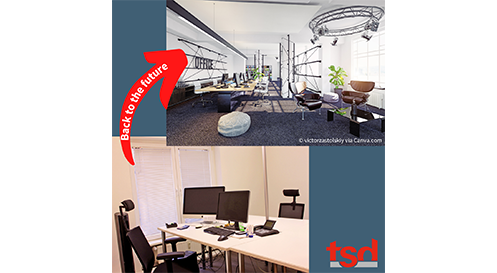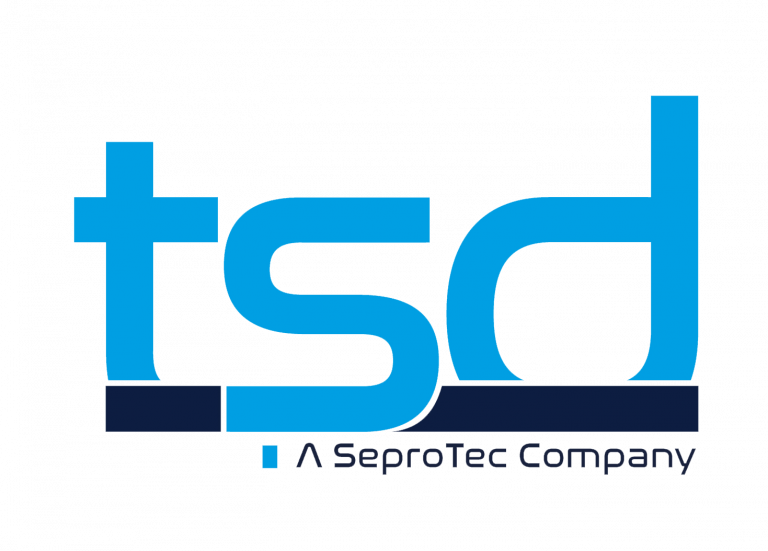Back to the future … office, that is
Work is a big part of our life and so is our workspace. No wonder we want to feel comfortable while working. But what exactly characterises our workplace? A coffee mug, pictures of the family, a plant or maybe personal decorations – all possible answers to describe your desk in our tsd “colleague book”. What is a “colleague book”? Well, it’s like the “friendship book” you might remember from school, just for colleagues – yes, we are that cheesy.
Anyway, we asked our team this very question and a heated discussion broke out, with work-life balance right at the top of our colleagues‘ priority list. Not that commuting to and from work wasn’t annoying before, but now we have a much better idea of how to make better use of our time for other activities.
What is missing when working from home, however, are the dear colleagues with whom you can chat over a coffee in the kitchen or laugh about the everyday messes in the office. What can we say, we at tsd just love our colleagues! <3
How do you balance all these different aspects? We have summed up our experiences and developed some best practices for the future office.
The Goldilocks number for hybrid working
So, what should the workplace of the future look like? We asked the entire tsd team what working model they envision and what they would like to see in the office of tomorrow. After all, they are practically experts in the field, as they have a profession that has often been performed from home even before the lockdown.
It comes as no surprise to us that 89% of our team are very satisfied or somewhat satisfied with their arrangements when working from home. However, as already mentioned, we especially love our colleagues, so it makes sense that 91% would either “definitely” or “maybe” work in the office again. A hybrid office arrangement thus seems to be the optimal solution for us at tsd.
As is so often the case with LinkedIn polls, the answers regarding the optimal number of days in the office for our team vary greatly from „every day“ to „once in a blue moon“.

Our team has identified the Goldilocks number though: two office days a week. Worth noting, however, is that the decision of two days over three days was a close one. Here too, the results are consistent with other LinkedIn poll results. It’s likely that many of our colleagues voted on LinkedIn. 😀
Sharing is caring – even in the workspace
But how does a company deal with a workforce that works partly here and partly there? Do you still need the whole office space? And what happens when the office day of every employee falls on the same day? For example, the day of the summer party, which of course no one wants to miss.
Our team can very well imagine a desk-sharing concept. 11 of our colleagues have even worked with such a concept before and can recommend it.
The three most important factors that the employer should consider for the best employee experience, however, are:
- Clear communication on which and how many desks are available on which day
- Clear rules on how to proceed if there aren’t enough desks available
- Locker space for personal belongings

We are definitely looking forward to seeing other faces in the seat next to us and who knows, maybe desk-sharing does wonders for team-building … Not that we would never give up our Sport Challenge and our book club, of course ?
(Shared) desk practice is best practice
So, why are we telling you about all this? Because when researching the best workspace solutions for our team, we felt that learning from the experience of others is most helpful. Therefore, we want to share our best practices with our community as well … and maybe even inspire you during this short read.
Our 5 best practices:
- A hybrid working model with optimally 2 office days in a week. Any number of office days should be feasible though, as long as your team won’t be strangers.
- A desk sharing concept with clear rules on available desk spaces. And don’t forget to provide lockers for personal belongings. A coffee mug, pictures of the family, a plant or personal decorations still define a comfortable working environment for many people.
- Designated collaboration rooms might do wonders for your teamwork. After all, we are a fan of “task forces” for certain topics and that way any colleagues who need a quiet workspace to work are not bothered.
- Dedicated space for breaks / to recharge are a must! We are in fact using our conference room for table tennis matches during our breaks.
- Booths for phone/ video calls, especially for jobs heavily involving telephone communication like, among others, Project and Sales Managers. A stylish English phone booth like the one in Dr. Who sounds like fun indeed.
We hope we helped you in your endeavours of creating the “future workplace”. Feel free to leave your thoughts and best practices in the comments.
